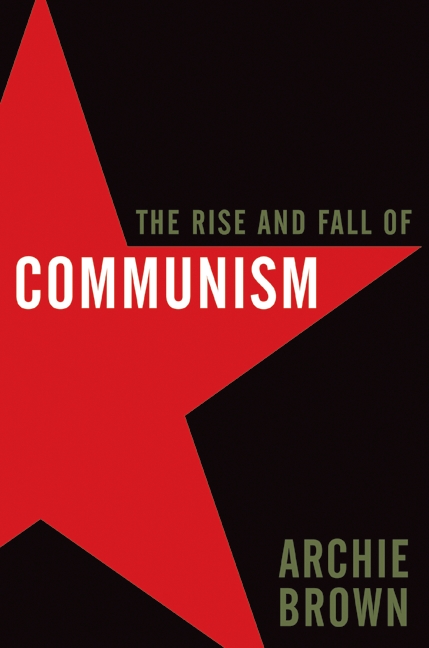
The Rise and Fall of Communism
by Archie Brown
-Reviewed by Adam Fleisher
When the Soviet Union unraveled, so did the last vestiges of the notion that Communism was a viable means of organizing society. It did not deliver, to say the least, on its promise of justice and equality in contrast to the suffering that capitalism supposedly caused. As Archie Brown puts it in The Rise and Fall of Communism, the whole enterprise had been “a ghastly failure.”
And yet by the late 1970s there were still, by Brown’s count, sixteen countries living under Communist rule, mostly within the orbit of the USSR. The prevalence and durability of an unpopular and ineffective form of government begs the questions that this formidable book addresses: how did Communists manage to take power, how did they hold on to it, and why did they eventually lose it?
Brown, Emeritus Professor at Oxford University, documents a similar story in country after country. Communists came to power and governed by force and coercion because, almost without exception, people did not submit to nor live under Communist rule voluntarily. Reordering society required controlling political behavior and restricting information, which “led logically to physical repression and party dictatorship.” The survival of the dictatorship – that is, of the Communist Party – depended on the top leadership’s use of the coercive apparatus. In Brown’s estimation, Mikhail Gorbachev’s unwillingness to employ it explains Communism’s fall.
It may surprise some American readers to see Pope John Paul II and Ronald Reagan relegated to relatively minor roles. While Rise and Fall does underestimate the importance of Reagan’s confrontational rhetoric and supportive outreach, it nonetheless makes a compelling argument for the unique significance of Gorbachev. Brown credits the infamous Secret Speech of 1956 for laying the initial groundwork for Gorbachev’s rise. Khrushchev’s revelation of Stalin’s crimes “pricked the bubble of infallibility with which the Communist Party had surrounded itself.” Because it shattered remaining illusions in the West about the nature of Communism, the speech was the beginning of the end.
The Prague Spring of 1968, which Brown calls a “delayed reaction” to Khrushchev’s speech, was a harbinger of that end. The freedom briefly enjoyed then was “the culmination of a reform movement inside the Communist Party of Czechoslovakia.” It could be turned back only by Soviet military intervention. Though not realized at the time, Brown makes the crucial point that if a similar reform movement had ever gained strength within the Communist Party of the Soviet Union, there would have been no outside force to stop it.
By the time Gorbachev came to power in 1985, the economic, political and social sclerosis of the USSR was overwhelming. There was little freedom of movement, opportunity, or speech. Living standards were demonstrably lagging those in Western Europe and the United States. Gorbachev’s intention, as Brown emphasizes, was “reform of the system, not transformative change.” He initially operated under the assumption that some political liberalization and the decentralization of economic decision making would save and rehabilitate Communism. More freedom, in his words, would “open up space for the mightiest creative force of socialism.”
Instead, however, momentum built as political freedom led to pluralism and fissures appeared in the Party. By 1989 the ability of the Party to monopolize political debate and the flow of information was severely weakened. Without centralized power, the “leading role” of the Communist Party was moot, and the Soviet Union, essentially, was no longer Communist-ruled. As a result of the end of the monopoly, non-Communist reformist parties were able to come to power in the satellite states – and unlike in decades past were not turned back by the military. The increase in political freedom, combined with Gorbachev’s unwillingness to use force to preserve the Union, meant that its breakup could not be prevented.
As Brown neatly puts it, though it was thought that “the Communist system could not survive without being reformed,” it turned out that it “could not survive with radical reform.” Dissidents, human rights advocates, President Reagan and the Pope knew the reality of Communism all too well. Rise and Fall is ultimately the story of Communists learning it themselves.
Excerpt: “Foreign travel did not automatically broaden the minds of Soviet officials. Few were as well traveled as Andrey Gromyko but he remained set in his ways. Many Soviet politicians and bureaucrats found rationalizations for the extent to which the USSR lagged far behind its Western rivals. Others, for the sake of their careers, engaged in prolonged self-censorship. But the more East-West travel was allowed to take place, the greater was the erosion of Marxist-Leninist ideology. Ideas of liberty and democracy were under no such threat. Western countries had, or should have had, no reason for concern about an increase in the modest numbers of people allowed to travel to their countries from the Soviet and East European states.”
Further Reading: Seven Years that Changed the World: Perestroika in Perspective and The Rebellion of Ronald Reagan: A History of the End of the Cold War




Send A Letter To the Editors